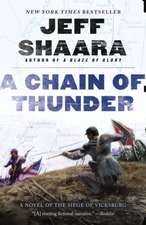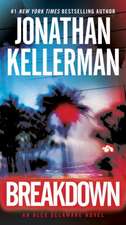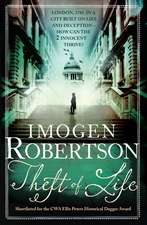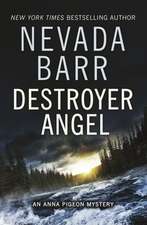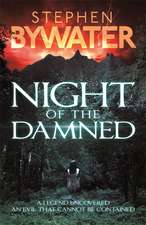The Clinic: Alex Delaware Novels
Autor Jonathan Kellermanen Limba Engleză Paperback – 25 mar 2013
Professor Hope Devane’s male-bashing pop-psych bestseller created a storm of controversy on the talk-show circuit. Now she is dead, brutally slashed on a quiet street in one of L.A.’s safest neighborhoods. The LAPD’s investigation has gone cold, and homicide detective Milo Sturgis turns to his friend Dr. Alex Delaware for a psychological profile of the victim—and a portrait of a killer.
“Engrossing . . . mines new realms of psychological terror . . . holds the reader riveted.”—Playboy
Hope Devane had very different public and private faces. The killer could be any one of the millions who read her book, or someone from the personal life she kept so carefully separate. As Alex and Milo dig deeper into her shadowy past, they will set an elaborate trap for her killer . . . and reveal the unspeakable act that triggered a dark chain of violence.
| Toate formatele și edițiile | Preț | Express |
|---|---|---|
| Paperback (2) | 65.01 lei 3-5 săpt. | |
| BALLANTINE BOOKS – 25 mar 2013 | 65.01 lei 3-5 săpt. | |
| Headline – 8 ian 2009 | 79.82 lei 17-23 zile |
Din seria Alex Delaware Novels
-
 Preț: 58.12 lei
Preț: 58.12 lei -
 Preț: 61.20 lei
Preț: 61.20 lei -
 Preț: 60.57 lei
Preț: 60.57 lei -
 Preț: 59.35 lei
Preț: 59.35 lei -
 Preț: 62.84 lei
Preț: 62.84 lei -
 Preț: 61.88 lei
Preț: 61.88 lei -
 Preț: 60.98 lei
Preț: 60.98 lei -
 Preț: 58.12 lei
Preț: 58.12 lei -
 Preț: 62.92 lei
Preț: 62.92 lei -
 Preț: 57.71 lei
Preț: 57.71 lei -
 Preț: 58.53 lei
Preț: 58.53 lei -
 Preț: 57.08 lei
Preț: 57.08 lei -
 Preț: 60.17 lei
Preț: 60.17 lei -
 Preț: 60.39 lei
Preț: 60.39 lei -
 Preț: 57.71 lei
Preț: 57.71 lei -
 Preț: 60.80 lei
Preț: 60.80 lei -
 Preț: 65.32 lei
Preț: 65.32 lei -
 Preț: 60.39 lei
Preț: 60.39 lei -
 Preț: 61.28 lei
Preț: 61.28 lei -
 Preț: 61.47 lei
Preț: 61.47 lei -
 Preț: 60.17 lei
Preț: 60.17 lei -
 Preț: 58.53 lei
Preț: 58.53 lei -
 Preț: 63.46 lei
Preț: 63.46 lei -
 Preț: 65.93 lei
Preț: 65.93 lei -
 Preț: 60.87 lei
Preț: 60.87 lei -
 Preț: 56.67 lei
Preț: 56.67 lei -
 Preț: 55.61 lei
Preț: 55.61 lei
Preț: 65.01 lei
Nou
Puncte Express: 98
Preț estimativ în valută:
12.44€ • 13.52$ • 10.46£
12.44€ • 13.52$ • 10.46£
Carte disponibilă
Livrare economică 01-15 aprilie
Preluare comenzi: 021 569.72.76
Specificații
ISBN-13: 9780345540195
ISBN-10: 0345540190
Pagini: 464
Dimensiuni: 104 x 193 x 30 mm
Greutate: 0.32 kg
Editura: BALLANTINE BOOKS
Seria Alex Delaware Novels
ISBN-10: 0345540190
Pagini: 464
Dimensiuni: 104 x 193 x 30 mm
Greutate: 0.32 kg
Editura: BALLANTINE BOOKS
Seria Alex Delaware Novels
Notă biografică
Jonathan Kellerman is one of the world’s most popular authors. He has brought his expertise as a clinical psychologist to more than thirty bestselling crime novels, including the Alex Delaware series, The Butcher’s Theater, Billy Straight, The Conspiracy Club, Twisted, and True Detectives. With his wife, the novelist Faye Kellerman, he co-authored the bestsellers Double Homicide and Capital Crimes. He is the author of numerous essays, short stories, scientific articles, two children’s books, and three volumes of psychology, including Savage Spawn: Reflections on Violent Children, as well as the lavishly illustrated With Strings Attached: The Art and Beauty of Vintage Guitars. He has won the Goldwyn, Edgar, and Anthony awards and has been nominated for a Shamus Award. Jonathan and Faye Kellerman live in California, New Mexico, and New York. Their four children include the novelists Jesse Kellerman and Aliza Kellerman.
Extras
CHAPTER
1
Few murder streets are lovely. This one was.
Elm-shaded, a softly curving stroll to the University, lined with generous haciendas and California colonials above lawns as unblemished as fresh billiard felt.
Giant elms. Hope Devane had bled to death under one of them, a block from her home, on the southwest corner.
I looked at the spot again, barely exposed by a reluctant moon. The night-quiet was broken only by crickets and the occasional late-model well-tuned car.
Locals returning home. Months past the curious-onlooker stage.
Milo lit up a cigarillo and blew smoke out the window.
Cranking my window down, I continued to stare at the elm.
A twisting trunk as thick as a freeway pylon supported sixty feet of opaque foliage. Stout, grasping branches appeared frosted in the moonlight, some so laden they brushed the ground.
Five years since the city had last pruned street trees. Property-tax shortfall. The theory was that the killer had hidden under the canopy, though no hint of presence other than bicycle tracks, a few feet away, was ever found.
Three months later, theory was all that remained and not much of that.
Milo’s unmarked Ford shared the block with two other cars, both Mercedeses, both with parking permits on their windshields.
After the murder, the city had promised to trim the elms. No follow-through yet.
Milo had told me about it with some bitterness, cursing politicians but really damning the cold case.
“A couple of news stories, then nada.”
“Current events as fast food,” I’d said. “Quick, greasy, forgettable.”
“Aren’t we the cynic.”
“Professional training: aiming for rapport with the patient.”
That had gotten a laugh out of him. Now he frowned, brushed hair off his forehead, and blew wobbly smoke rings.
Edging the car up the block, he parked again. “That’s her house.” He pointed to one of the colonials, smallish, but well-kept. White board front, four columns, dark shutters, shiny fittings on a shiny door. Three steps up from the sidewalk a flagstone path cut through the lawn. A picket gate blocked the driveway.
Two upstairs windows were amber behind pale curtains.
“Someone home?” I said.
“That’s his Volvo in the driveway.”
Light-colored station wagon.
“He’s always home,” said Milo. “Once he gets in he never leaves.”
“Still mourning?”
He shrugged. “She drove a little red Mustang. She was a lot younger than him.”
“How much younger?”
“Fifteen years.”
“What about him interests you?”
“The way he acts when I talk to him.”
“Nervous?”
“Unhelpful. Paz and Fellows thought so, too. For what that’s worth.”
He didn’t think much of the first detectives on the case and the common ground probably bothered him as much as anything.
“Well,” I said, “isn’t the husband always the first suspect? Though stabbing her out on the street doesn’t sound typical.”
“True.” He rubbed his eyes. “Braining her in the bedroom would have been more marital. But it happens.” Twirling the cigar. “Live long enough, everything happens.”
“Where exactly were the bicycle tracks?”
“Just north of the body but I wouldn’t make much of those. Lab guys say they could have been anywhere from one to ten days old. A neighbor kid, a student, a fitness freak, anyone. And no one I talked to when I did the door-to-door noticed an unusual biker that whole week.”
“What’s an unusual biker?”
“Someone who didn’t fit in.”
“Someone nonwhite?”
“Whatever works.”
“Quiet neighborhood like this,” I said, “it’s surprising no one saw or heard anything at eleven p.m.”
“Coroner said it’s possible she didn’t scream. No defense wounds, no tentatives, so she probably didn’t struggle much.”
“True.” I’d read the autopsy findings. Read the entire file, starting with Paz and Fellows’s initial report and ending with the pathologist’s dictated drone and the packet of postmortem photos. How many such pictures had I seen over the years? It never got easier.
“No scream,” I said, “because of the heart wound?”
“Coroner said it could have collapsed the heart, put her into instant shock.”
He snapped thick fingers softly, then ran his hand over his face, as if washing without water. What I could see of his profile was heavy as a walrus’s, pocked and fatigued.
He smoked some more. I thought again of the preautopsy photos, Hope Devane’s body ice-white under the coroner’s lights. Three deep purple stab wounds in close-up: chest, crotch, just above the left kidney.
The forensic scenario was that she’d been taken by surprise and dispatched quickly by the blow that exploded her heart, then slashed a second time above the vagina, and finally laid facedown on the sidewalk and stabbed in the back.
“A husband doing that,” I said. “I know you’ve seen worse but it seems so calculated.”
“This husband’s an intellectual, right? A thinker.” Smoke escaped the car in wisps, decaying instantly at the touch of night air. “Truth is, Alex, I want it to be Seacrest for selfish reasons. ’Cause if it’s not him, it’s a goddamn logistical nightmare.”
“Too many suspects.”
“Oh yeah,” he said, almost singing it. “Lots of people who could’ve hated her.”
CHAPTER
2
A self-help book changed Hope Devane’s life.
Wolves and Sheep wasn’t the first thing she published: a psychology monograph and three dozen journal articles had earned her a full professorship at thirty-eight, two years before her death.
Tenure had given her job security and the freedom to enter the public eye with a book the tenure committee wouldn’t have liked.
Wolves made the best-seller lists for a month, earning her center ring in the media circus and more money than she could have accumulated in ten years as a professor.
She was suited to the public eye, blessed with the kind of refined, blond good looks that played well on the small screen. That, and a soft, modulated voice that came across confident and reasonable over the radio, meant she had no trouble getting publicity bookings. And she made the most of each one. For despite Wolves’s subtitle, Why Men Inevitably Hurt Women and What Women Can Do to Avoid It, and its indicting tone, her public persona was that of an intelligent, articulate, thoughtful, pleasant woman entering the public arena with reluctance but performing graciously.
I knew all that but had little understanding of the person she’d been.
Milo had left me three LAPD evidence boxes to review: her resume, audio- and videotapes, some newspaper coverage, the book. All passed along by Paz and Fellows. They’d never studied any of it.
He’d told me about inheriting the case the night before, sitting across the table from Robin and me at a seafood place in Santa Monica. The bar was crowded but half the booths were empty and we sat in a corner, away from sports on big-screen and frightened people trying to connect with strangers. Midway through the meal Robin left for the ladies’ room and Milo said, “Guess what I got for Christmas?”
“Christmas is months away.”
“Maybe that’s why this is no gift. Cold case. Three months cold: Hope Devane.”
“Why now?”
“ ’Cause it’s dead.”
“The new lieutenant?”
He dipped a shrimp in sauce and put the whole thing in his mouth. As he chewed, his jaw bunched. He kept looking around the room even though there was nothing to see.
New lieutenant, same old pattern.
He was the only acknowledged gay detective in the LAPD, would never be fully accepted. His twenty-year climb to Detective III had been marked by humiliation, sabotage, periods of benign neglect, near-violence. His solve record was excellent and sometimes that helped keep the hostility under the surface. His quality of life depended upon the attitude of the superior-of-the-moment. The new one was baffled and nervous, but too preoccupied with a dispirited postriot department to pay too much attention to Milo.
“He gave it to you because he thinks it’s a low-probability solve?”
He smiled, as if savoring a private joke.
“Also,” he said, “he figures Devane might have been a lesbian. ‘Should be right up your . . . ahem ahem . . . alley, Sturgis.’ ”
Another shrimp disappeared. His lumpy face remained static and he folded his napkin double, then unfolded it. His necktie was a horrid brown-and-ochre paisley fighting a duel with his gray hounds-tooth jacket. His black hair, now flecked with white, had been chopped nearly to the skin at the sides, but the top had been left long and the sideburns were still long—and completely snowy.
“Is there any indication she was gay?” I said.
“Nope. But she had tough things to say about men, so ergo, ipso facto.”
Robin returned. She’d reapplied her lipstick and had fluffed her hair. The royal-blue dress intensified the auburn, the silk accentuated every movement. We’d spent some time on a Pacific island and her olive skin had held on to the tan.
I’d killed a man there. Clear self-defense—saving Robin’s life as well as mine. Sometimes I still had nightmares.
“You two look serious,” she said, slipping into the booth. Our knees touched.
“Doing my homework,” said Milo. “I know how much this guy enjoyed school, so I thought I’d share it.”
“He just got the Hope Devane murder,” I said.
“I thought they’d given up on that.”
“They have.”
“What a terrifying thing.”
Something in her voice made me look at her.
“More terrifying,” I said, “than any other murder?”
“In some ways, Alex. Good neighborhood like that, you go for a walk right outside your house and someone jumps out and cuts you?”
I placed my hand on top of hers. She didn’t seem to notice.
“The first thing I thought of,” she said, “was she was killed because of her views. And that would make it terrorism. But even if it was just some nut picking her at random, it’s still terrorism in a sense. Personal freedom in this city kicked another notch lower.”
Our knees moved apart. Her fingers were delicate icicles.
“Well,” she said, “at least you’re on it, Milo. Anything so far?”
“Not yet,” he said. “Situation like this, what you do is start fresh. Let’s hope for the best.”
In the kindest of times optimism was a strain for him. The words sounded so out-of-character he could have been auditioning for summer stock.
“Also,” he said, “I thought Alex might be able to help me. Dr. Devane being a psychologist.”
“Did you know her, Alex?”
I shook my head.
The waiter came over. “More wine?”
“Yes,” I said. “Another bottle.”
The next morning, Milo brought me the boxes and left. On top was the academic resume.
Her full name was Hope Alice Devane. Father: Andre. Mother: Charlotte. Both deceased.
Under marital status, she’d typed married, but she hadn’t listed Philip Seacrest’s name.
children: none.
She’d been born in California, in a town I’d never heard of called Higginsville. Probably somewhere in the center of the state, because she’d graduated from Bakersfield High School as class valedictorian and a National Merit Scholar before enrolling at UC Berkeley as a Regent’s Scholar. Dean’s list every quarter, Phi Beta Kappa, graduation with a summa cum laude degree in psychology, then continuation at Berkeley for her Ph.D.
She’d published her first two papers as a graduate student and moved to L.A. for clinical training: internship and postdoctoral fellowship, crosstown, in the Psychiatry Department at County General Hospital. Then an appointment as a lecturer in women’s studies at the University and a transfer, the following year, to the Psychology Department as an assistant professor.
Next came ten pages of society memberships, scholarly publications, abstracts, papers delivered at conferences. Her first research topic had been differential achievement in girls and boys on mathematics tests, then she’d shifted gears to sex roles and child-rearing methods, and, once again, to sex roles as they affected self-control.
An average of five articles a year in solid journals—premium gas for a Ferrari on the tenure fast track. It could have been any C.V., until I came to the tail end of the bibliography section where a subheading entitled Nonpeer Review Publication and Media Work gave an inkling of the turn she’d taken during the year before her death.
Wolves and Sheep, along with its foreign editions, followed by scores of radio and TV and print interviews, appearances on afternoon talk shows.
Shows with titles like FIGHT BACK! Dogging the Predator, The New Slaves, The Testosterone Conspiracy.
The final section was Departmental and Campus Activities and it brought things back to dusty academia.
As an assistant professor she’d sat on four committees. Scheduling and Room Allocation, Graduate Student Orientation, Animal-Subject Safety—the kind of drudgery I knew well—then, six months before her death, she’d chaired something called Interpersonal Conduct that I’d never heard of.
Something to do with sexual harassment? Exploitation of students by faculty? That was something with hostility potential. I placed a check next to the notation and moved on to Wolves and Sheep.
The book jacket was matte red with embossed gold letters and a small black graphic between author and title: silhouettes of the eponymous animals.
The wolf’s mouth was crammed with fangs and its claws reached out for the undersized sheep. On the back was Hope Devane’s color photo. She had an oval face and sweet features, wore a beige cashmere suit and pearls and sat very straight in a brown suede chair backed by shelves of books in soft focus. Mont-Blanc pen in hand, sterling inkwell within reach. Long fingers, pink-polished nails. Honey-blond hair swept back from fine bones, the cheeks accentuated by blush. Light brown eyes clear and wide and direct, soft without being weak. A confident, possibly ironic smile on nacreous lips.
The pages were dog-eared and Milo’s yellow underlining and pen scrawl were all over the margins. I read the book, drove two miles down Beverly Glen and over to the University, where I played with the Biomed library computers for a while.
Interesting results. I returned home, watched the talk-show tapes.
1
Few murder streets are lovely. This one was.
Elm-shaded, a softly curving stroll to the University, lined with generous haciendas and California colonials above lawns as unblemished as fresh billiard felt.
Giant elms. Hope Devane had bled to death under one of them, a block from her home, on the southwest corner.
I looked at the spot again, barely exposed by a reluctant moon. The night-quiet was broken only by crickets and the occasional late-model well-tuned car.
Locals returning home. Months past the curious-onlooker stage.
Milo lit up a cigarillo and blew smoke out the window.
Cranking my window down, I continued to stare at the elm.
A twisting trunk as thick as a freeway pylon supported sixty feet of opaque foliage. Stout, grasping branches appeared frosted in the moonlight, some so laden they brushed the ground.
Five years since the city had last pruned street trees. Property-tax shortfall. The theory was that the killer had hidden under the canopy, though no hint of presence other than bicycle tracks, a few feet away, was ever found.
Three months later, theory was all that remained and not much of that.
Milo’s unmarked Ford shared the block with two other cars, both Mercedeses, both with parking permits on their windshields.
After the murder, the city had promised to trim the elms. No follow-through yet.
Milo had told me about it with some bitterness, cursing politicians but really damning the cold case.
“A couple of news stories, then nada.”
“Current events as fast food,” I’d said. “Quick, greasy, forgettable.”
“Aren’t we the cynic.”
“Professional training: aiming for rapport with the patient.”
That had gotten a laugh out of him. Now he frowned, brushed hair off his forehead, and blew wobbly smoke rings.
Edging the car up the block, he parked again. “That’s her house.” He pointed to one of the colonials, smallish, but well-kept. White board front, four columns, dark shutters, shiny fittings on a shiny door. Three steps up from the sidewalk a flagstone path cut through the lawn. A picket gate blocked the driveway.
Two upstairs windows were amber behind pale curtains.
“Someone home?” I said.
“That’s his Volvo in the driveway.”
Light-colored station wagon.
“He’s always home,” said Milo. “Once he gets in he never leaves.”
“Still mourning?”
He shrugged. “She drove a little red Mustang. She was a lot younger than him.”
“How much younger?”
“Fifteen years.”
“What about him interests you?”
“The way he acts when I talk to him.”
“Nervous?”
“Unhelpful. Paz and Fellows thought so, too. For what that’s worth.”
He didn’t think much of the first detectives on the case and the common ground probably bothered him as much as anything.
“Well,” I said, “isn’t the husband always the first suspect? Though stabbing her out on the street doesn’t sound typical.”
“True.” He rubbed his eyes. “Braining her in the bedroom would have been more marital. But it happens.” Twirling the cigar. “Live long enough, everything happens.”
“Where exactly were the bicycle tracks?”
“Just north of the body but I wouldn’t make much of those. Lab guys say they could have been anywhere from one to ten days old. A neighbor kid, a student, a fitness freak, anyone. And no one I talked to when I did the door-to-door noticed an unusual biker that whole week.”
“What’s an unusual biker?”
“Someone who didn’t fit in.”
“Someone nonwhite?”
“Whatever works.”
“Quiet neighborhood like this,” I said, “it’s surprising no one saw or heard anything at eleven p.m.”
“Coroner said it’s possible she didn’t scream. No defense wounds, no tentatives, so she probably didn’t struggle much.”
“True.” I’d read the autopsy findings. Read the entire file, starting with Paz and Fellows’s initial report and ending with the pathologist’s dictated drone and the packet of postmortem photos. How many such pictures had I seen over the years? It never got easier.
“No scream,” I said, “because of the heart wound?”
“Coroner said it could have collapsed the heart, put her into instant shock.”
He snapped thick fingers softly, then ran his hand over his face, as if washing without water. What I could see of his profile was heavy as a walrus’s, pocked and fatigued.
He smoked some more. I thought again of the preautopsy photos, Hope Devane’s body ice-white under the coroner’s lights. Three deep purple stab wounds in close-up: chest, crotch, just above the left kidney.
The forensic scenario was that she’d been taken by surprise and dispatched quickly by the blow that exploded her heart, then slashed a second time above the vagina, and finally laid facedown on the sidewalk and stabbed in the back.
“A husband doing that,” I said. “I know you’ve seen worse but it seems so calculated.”
“This husband’s an intellectual, right? A thinker.” Smoke escaped the car in wisps, decaying instantly at the touch of night air. “Truth is, Alex, I want it to be Seacrest for selfish reasons. ’Cause if it’s not him, it’s a goddamn logistical nightmare.”
“Too many suspects.”
“Oh yeah,” he said, almost singing it. “Lots of people who could’ve hated her.”
CHAPTER
2
A self-help book changed Hope Devane’s life.
Wolves and Sheep wasn’t the first thing she published: a psychology monograph and three dozen journal articles had earned her a full professorship at thirty-eight, two years before her death.
Tenure had given her job security and the freedom to enter the public eye with a book the tenure committee wouldn’t have liked.
Wolves made the best-seller lists for a month, earning her center ring in the media circus and more money than she could have accumulated in ten years as a professor.
She was suited to the public eye, blessed with the kind of refined, blond good looks that played well on the small screen. That, and a soft, modulated voice that came across confident and reasonable over the radio, meant she had no trouble getting publicity bookings. And she made the most of each one. For despite Wolves’s subtitle, Why Men Inevitably Hurt Women and What Women Can Do to Avoid It, and its indicting tone, her public persona was that of an intelligent, articulate, thoughtful, pleasant woman entering the public arena with reluctance but performing graciously.
I knew all that but had little understanding of the person she’d been.
Milo had left me three LAPD evidence boxes to review: her resume, audio- and videotapes, some newspaper coverage, the book. All passed along by Paz and Fellows. They’d never studied any of it.
He’d told me about inheriting the case the night before, sitting across the table from Robin and me at a seafood place in Santa Monica. The bar was crowded but half the booths were empty and we sat in a corner, away from sports on big-screen and frightened people trying to connect with strangers. Midway through the meal Robin left for the ladies’ room and Milo said, “Guess what I got for Christmas?”
“Christmas is months away.”
“Maybe that’s why this is no gift. Cold case. Three months cold: Hope Devane.”
“Why now?”
“ ’Cause it’s dead.”
“The new lieutenant?”
He dipped a shrimp in sauce and put the whole thing in his mouth. As he chewed, his jaw bunched. He kept looking around the room even though there was nothing to see.
New lieutenant, same old pattern.
He was the only acknowledged gay detective in the LAPD, would never be fully accepted. His twenty-year climb to Detective III had been marked by humiliation, sabotage, periods of benign neglect, near-violence. His solve record was excellent and sometimes that helped keep the hostility under the surface. His quality of life depended upon the attitude of the superior-of-the-moment. The new one was baffled and nervous, but too preoccupied with a dispirited postriot department to pay too much attention to Milo.
“He gave it to you because he thinks it’s a low-probability solve?”
He smiled, as if savoring a private joke.
“Also,” he said, “he figures Devane might have been a lesbian. ‘Should be right up your . . . ahem ahem . . . alley, Sturgis.’ ”
Another shrimp disappeared. His lumpy face remained static and he folded his napkin double, then unfolded it. His necktie was a horrid brown-and-ochre paisley fighting a duel with his gray hounds-tooth jacket. His black hair, now flecked with white, had been chopped nearly to the skin at the sides, but the top had been left long and the sideburns were still long—and completely snowy.
“Is there any indication she was gay?” I said.
“Nope. But she had tough things to say about men, so ergo, ipso facto.”
Robin returned. She’d reapplied her lipstick and had fluffed her hair. The royal-blue dress intensified the auburn, the silk accentuated every movement. We’d spent some time on a Pacific island and her olive skin had held on to the tan.
I’d killed a man there. Clear self-defense—saving Robin’s life as well as mine. Sometimes I still had nightmares.
“You two look serious,” she said, slipping into the booth. Our knees touched.
“Doing my homework,” said Milo. “I know how much this guy enjoyed school, so I thought I’d share it.”
“He just got the Hope Devane murder,” I said.
“I thought they’d given up on that.”
“They have.”
“What a terrifying thing.”
Something in her voice made me look at her.
“More terrifying,” I said, “than any other murder?”
“In some ways, Alex. Good neighborhood like that, you go for a walk right outside your house and someone jumps out and cuts you?”
I placed my hand on top of hers. She didn’t seem to notice.
“The first thing I thought of,” she said, “was she was killed because of her views. And that would make it terrorism. But even if it was just some nut picking her at random, it’s still terrorism in a sense. Personal freedom in this city kicked another notch lower.”
Our knees moved apart. Her fingers were delicate icicles.
“Well,” she said, “at least you’re on it, Milo. Anything so far?”
“Not yet,” he said. “Situation like this, what you do is start fresh. Let’s hope for the best.”
In the kindest of times optimism was a strain for him. The words sounded so out-of-character he could have been auditioning for summer stock.
“Also,” he said, “I thought Alex might be able to help me. Dr. Devane being a psychologist.”
“Did you know her, Alex?”
I shook my head.
The waiter came over. “More wine?”
“Yes,” I said. “Another bottle.”
The next morning, Milo brought me the boxes and left. On top was the academic resume.
Her full name was Hope Alice Devane. Father: Andre. Mother: Charlotte. Both deceased.
Under marital status, she’d typed married, but she hadn’t listed Philip Seacrest’s name.
children: none.
She’d been born in California, in a town I’d never heard of called Higginsville. Probably somewhere in the center of the state, because she’d graduated from Bakersfield High School as class valedictorian and a National Merit Scholar before enrolling at UC Berkeley as a Regent’s Scholar. Dean’s list every quarter, Phi Beta Kappa, graduation with a summa cum laude degree in psychology, then continuation at Berkeley for her Ph.D.
She’d published her first two papers as a graduate student and moved to L.A. for clinical training: internship and postdoctoral fellowship, crosstown, in the Psychiatry Department at County General Hospital. Then an appointment as a lecturer in women’s studies at the University and a transfer, the following year, to the Psychology Department as an assistant professor.
Next came ten pages of society memberships, scholarly publications, abstracts, papers delivered at conferences. Her first research topic had been differential achievement in girls and boys on mathematics tests, then she’d shifted gears to sex roles and child-rearing methods, and, once again, to sex roles as they affected self-control.
An average of five articles a year in solid journals—premium gas for a Ferrari on the tenure fast track. It could have been any C.V., until I came to the tail end of the bibliography section where a subheading entitled Nonpeer Review Publication and Media Work gave an inkling of the turn she’d taken during the year before her death.
Wolves and Sheep, along with its foreign editions, followed by scores of radio and TV and print interviews, appearances on afternoon talk shows.
Shows with titles like FIGHT BACK! Dogging the Predator, The New Slaves, The Testosterone Conspiracy.
The final section was Departmental and Campus Activities and it brought things back to dusty academia.
As an assistant professor she’d sat on four committees. Scheduling and Room Allocation, Graduate Student Orientation, Animal-Subject Safety—the kind of drudgery I knew well—then, six months before her death, she’d chaired something called Interpersonal Conduct that I’d never heard of.
Something to do with sexual harassment? Exploitation of students by faculty? That was something with hostility potential. I placed a check next to the notation and moved on to Wolves and Sheep.
The book jacket was matte red with embossed gold letters and a small black graphic between author and title: silhouettes of the eponymous animals.
The wolf’s mouth was crammed with fangs and its claws reached out for the undersized sheep. On the back was Hope Devane’s color photo. She had an oval face and sweet features, wore a beige cashmere suit and pearls and sat very straight in a brown suede chair backed by shelves of books in soft focus. Mont-Blanc pen in hand, sterling inkwell within reach. Long fingers, pink-polished nails. Honey-blond hair swept back from fine bones, the cheeks accentuated by blush. Light brown eyes clear and wide and direct, soft without being weak. A confident, possibly ironic smile on nacreous lips.
The pages were dog-eared and Milo’s yellow underlining and pen scrawl were all over the margins. I read the book, drove two miles down Beverly Glen and over to the University, where I played with the Biomed library computers for a while.
Interesting results. I returned home, watched the talk-show tapes.
Recenzii
“Kellerman doesn’t just write psychological thrillers—he owns the genre.”—Detroit Free Press
“Quite possibly the best of the series—and that’s saying quite a lot.”—Chicago Tribune
“Quite possibly the best of the series—and that’s saying quite a lot.”—Chicago Tribune





